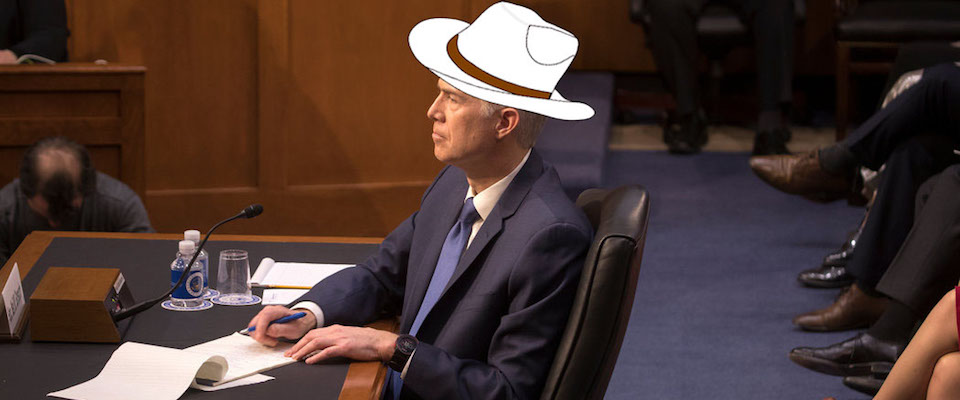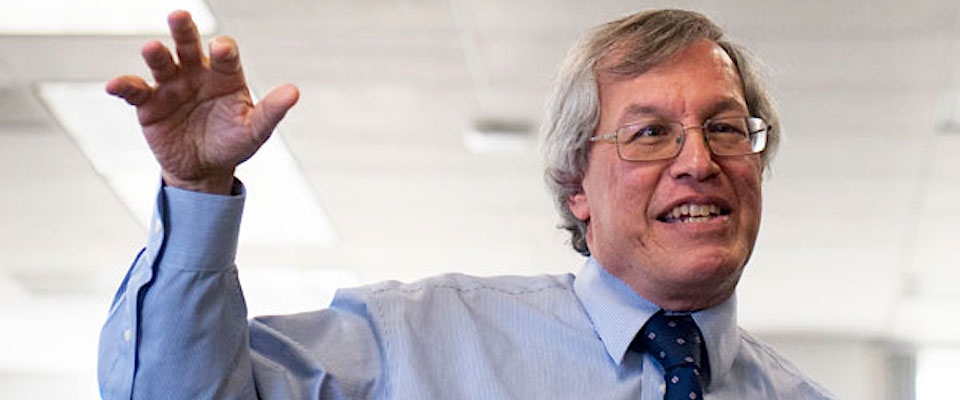Most of the discussion surrounding the nomination of Judge Neil Gorsuch to the US Supreme Court has, quite properly, centered around the jurist’s judicial philosophy and political leanings, and the opinions he has issued from the bench. (In case you’re just tuning in, court watchers place Trump’s nominee on the right of the spectrum, more conservative than Samuel Alito and on one side or the other of the late Antonin Scalia depending on the issue. Like Scalia, whom Gorsuch admired, he is a particular kind of originalist, one who believes not merely that the constitution should be interpreted based on the framers’ original intent, but that meaning is fixed and represents what any reasonable person might have understood it to mean at the time it was written.)
But while Democrats were busy grilling the judge about his positions vis a vis abortion, euthanasia, the Second Amendment and other key constitutional questions, some Republicans in Congress seemed less focused on his judicial and political orientation and more interested in his regional identity, intent on painting their man as a dyed in the wool Westerner and a necessary corrective to the court’s Eastern sensibilities.
From the floor, Senator Jeff Flake of Arizona, put it bluntly. “As an Arizonan, I cannot overstate how important it would be to have a fellow Westerner serving on the Supreme Court. Where you’re from influences your understanding of cultural and regional sensitivities. When you look at the current makeup of the Supreme Court, there is an unmistakable lack of geographic diversity. Of the eight current Justices, five of them were born in New York or New Jersey and that number stood at six before Justice Scalia’s passing.”
Somewhat grudgingly Flake acknowledged Justice Kennedy’s northern California (Sacramento) roots before dismissing them. Californians may think of themselves as Westerners, but Flake has news for them. “To be frank,” he said, “much of northern California is about as culturally ‘Western’ as Justice Breyer’s hometown of Boston.” (This is not a new idea. Teddy Roosevelt once said that when he was in California, he was “west of the West.”)
“[The Supreme Court] used to be more diverse, and it used to be that where you were from mattered,” says UC Berkeley Law’s Jesse Choper. “I think it still does, but I think where they were educated matters more.”
At first blush, Gorsuch’s western bona fides are plain enough. A fourth-generation Coloradan, he was born in Denver and now serves on the federal appellate court there. The Denver Post reports that Gorsuch and his family keep chickens, goats and horses on their three-acre lot on the Front Range. But even putting aside the fact that those three acres are in a gated community outside ultra-liberal Boulder (Berkeley’s unofficial sister city to the East), the Rocky Mountain biography is complicated by the fact that Gorsuch went to high school at Georgetown Prep, a parochial school in Bethesda, Maryland, before earning degrees from Columbia and Harvard Law (same class as Obama) and, finally, Oxford. Just judging by his educational C.V., Gorsuch is more East Coast preppy than western provincial.
Still, Senator Flake had a valid point.
“The court is by no means representative of the country,” says Berkeley Law’s Jesse Choper, “not geographically, not religiously, not educationally. The fact is that every one of them was from either Harvard or Yale. It used to be more diverse [in that sense], and it used to be that where you were from mattered. I think it still does, but I think where they were educated matters more.” This lack of educational diversity was something Justice Antonin Scalia (Harvard Law, ‘60) also lamented.
But at the confirmation hearings, Gorsuch’s Republican interlocutors had more important things on their mind than their nominee’s Ivy League schooling. Congressman Mike Crapo of Idaho led with the following hardball, “Would you tells us where your favorite fishing stream is?” And Senator Flake followed that line of questioning with, “What is the largest trout you ever caught?”
It wasn’t all A River Runs Through It though. The weirdest and most fawning exchange was between Texas Senator Ted Cruz and Gorsuch on the subject of mutton busting, a newfangled rodeo sport for tykes that manages to combine elements of child abuse and animal cruelty in one family-friendly spectacle. As Gorsuch giddily explained it, “You take a poor little kid, you find a sheep, and you attach the one to the other and see how long they can hold on….I tell my kids to hold on monkey-style—you know, really get in there…”
As a Texan—and presumably also as a Princeton alumnus and Harvard Law graduate—Cruz said he felt like everyone’s life could be enriched by going to the rodeo. And he commended Gorsuch for taking his sissified law clerks to Denver’s Grand National to see, among other things, little kids clinging to scared sheep like crazed chimpanzees.
Indeed, Cruz looked on so lovingly from the gallery that The Daily Show’s Trevor Noah quipped that he looked like a man who was “reconsidering same-sex unions.”
The Daily Show also spliced together clips of Gorsuch sounding like “every action movie hero ever,” with pronouncements such as, “Nobody speaks for me. Nobody. I’m a judge,” and, “You better believe I expect judicial decrees to be obeyed.” Put a “pilgrim” on the end of those lines and it could have been John Wayne speaking. When he wasn’t doing the tough talk, Gorsuch frosted his speech with aw-schucks earnestness—lots of goshes and gollies and my goodnesses.
We have this cherished idea of the West, says Cal historian Mark Brilliant, as that place where we finally “slip the bonds of European influence, the rugged individualist free of government interference… the place where we become distinctly American.”
Of course there’s nothing new about politicians playing up their western-ness. Think Ronald Reagan on his Santa Barbara ranch, George W. Bush in work gloves, clearing brush on his spread in Crawford, Texas. Even those with no claim whatsoever to the western roots often get in on the act. “Just Google president and cowboy hat,” says Berkeley historian Mark Brilliant, who specializes in the American West. “You’ll get them all; Obama, Carter, the Roosevelts. They all get their pictures taken in cowboy hats.”
Lest he come off as hypocritical, Brilliant hitched up a pant leg to show his cowboy boots. “And I didn’t grow up on a ranch. I just like wearing boots.”
More than boots, the cowboy hat may be the closest thing the West has to a flag, a symbol of the regional mythos. We have this cherished idea of the West, Brilliant says, as that place where we finally “slip the bonds of European influence, the rugged individualist free of government interference.… the place where we become distinctly American.” To don a Stetson is to tap into all of that.
And yet, while the Hollywood version of the West has it won by independent settlers and self-reliant cowboys, government interference (or at least government presence) is a defining characteristic of the region.
“It starts with the cavalry, continues with the Homestead Act and the railroads, and is extended with the Newlands Act in the New Deal,” says Brilliant.
He ticks off all the federal agencies that manage huge swaths of western lands: the Bureau of Land Management, US Forest Service, National Parks, the Defense Department. “You look at the per capita federal spending in a place like Alaska,” he says, “it’s off the charts. ….And yet despite that, or maybe because of it, there’s a kind of anti-statist strain that runs throughout the West,” including California. “Take a place like Orange County which has historically been red, and only recently flipped blue; it’s all defense contractors. It has long been the recipient of a kind of corporate welfare. Or take Silicon Valley, the myth of the garage, the up-from-the-bootstraps beginnings, as if the government had nothing to do with it.” That too, Brilliant argues, is an extension of the Western mythology, albeit on the left.
So, in the final analysis, does a justice’s western-ness matter?
In Professor Choper’s opinion, not so much. It could conceivably influence how they rule on matters like water laws or cases involving public lands, he allows, but so many of the cases they see have nothing to do with anything like that. “They’re more liable to be ruling on the administration of complex retirement plans or intricate patent disputes over mind-boggling new technologies. Western-ness has no bearing on those cases.”
Says Choper. “I think it’s nice that he’s from the West, but that’s not what they got him for. Let’s leave it at that.”




















